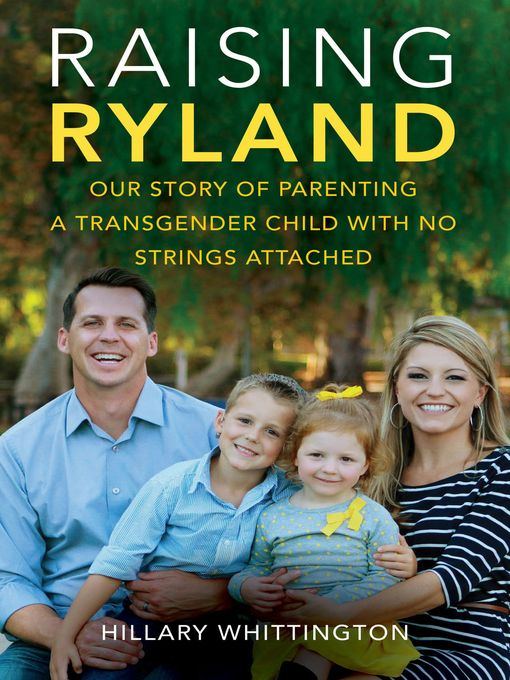
Raising Ryland
Our Story of Parenting a Transgender Child with No Strings Attached
کتاب های مرتبط
- اطلاعات
- نقد و بررسی
- دیدگاه کاربران
نقد و بررسی

December 21, 2015
Though Whittington has an admirable impulse to use the unexpected viral video fame of her transgender kindergarten-aged son, Ryland, for a teaching moment, her narrative comes across as overly self-congratulatory. Soon after Whittington and her husband, Jeff, addressed toddler Ryland’s deafness with cochlear implants, Ryland began to express clearly, in word and behavior, a male identity, in ways typically seen as markers for young transgender children. Ryland soon adopted male bathroom behavior and masculine hair, clothing, and toy preferences. Hillary researched the subject and learned that gender identity is established in children in the first few years of life. Realizing that the outcomes for trans youth unsupported by their families and communities are very poor, she committed herself to supporting Ryland’s transition, overcoming her own misgivings, and helping her husband and the people around them to understand. Hillary’s carefully crafted eight-page letter for friends and family may be a useful tool for other parents of transgender children. However, the immediacy seems to have been worn away from her well-rehearsed story, leaving more message than emotion.

December 15, 2015
A new family must regroup after their toddler exhibits gender ambivalence. Whittington, a mother of two, poignantly chronicles the transformative journey of Ryland, her young son who was born female. On his first birthday, the author's son was diagnosed as deaf. A year later, the child received cochlear implants to enable hearing and speech capability. Then, after expressing tomboy inclinations and masculine bathroom traits, he tearfully announced, "I'm a boy." Initially distressed, the family viewed the issue as much more than just a toddler phase and slowly began adapting to the fact that their daughter truly identified as a boy in every way. When their second daughter, Brynley, was born, they came to terms with their transgendered son. Both the author and her husband struggled with the critical next steps in Ryland's upbringing, his gender identity, and childhood development, while their greatest "fears came from how the world would view our child." The road was arduous, yet it began with a simple haircut and proper pronoun use. Amid the years of "private turmoil" and Ryland's many expected (and unexpected) challenges with school and societal rejection, the Whittingtons proactively educated themselves, posted videos online, and emerged as a consistently supportive and nurturing unit. Sensitively handled and written in breezy prose that doesn't linger too long on the expository details of their ordeal, the author sets a fine example for other parents either imagining or personally experiencing a similar situation. Believing their joint understanding and acceptance of Ryland will result in a blissful childhood, the Whittingtons have truly afforded their son the opportunity to "grow up with the chance to cultivate the same self-love and confidence to which every child has the right when he or she is born." An uplifting testimonial to the power of unconditional familial love and acceptance.
COPYRIGHT(2015) Kirkus Reviews, ALL RIGHTS RESERVED.

January 1, 2016
Several months after Whittington's daughter, Ryland, was born, the baby was diagnosed as profoundly deaf. With cochlear implants and therapy, Ryland learned by age four to express herself clearly. One of the things she said, however, was that she thinks she's a boy. Whittington recalls Ryland's step-by-step journey from uncomfortable little girl to thriving young man. It wasn't an easy trip. At first, Whittington sensed disapproval and disbelief from her husband, in-laws, family, and friends. She constantly questioned herself on whether she was failing Ryland by giving in to her requests. But at the same time, the mother in her was determined to support her now-son and listen to his longings. With the help of support groups, family, and literature searches, Whittington soon realized that gender is separate from sexuality and that Ryland is transgender. She presents a strong case for listening to and accepting children when they struggle with gender issues, even at an early age. Transgender identity isn't an easy issue, but it's one that's in the news, and readers will appreciate Whittington's honesty and courage.(Reprinted with permission of Booklist, copyright 2016, American Library Association.)

September 1, 2015
When daughter Ryland was one, Whittington and her husband learned that she was deaf and needed cochlear implants. At age five, Ryland announced that she was a boy, and the family facilitated Ryland's transition from daughter to son, as recapitulated in a video that has been seen by seven million viewers. Whittington here explains the decision she and her husband made while addressing practicalities like holding all the necessary conversations. In the news and on the screen (look for a Sundance Film documentary about the Whittingtons in January 2016); a 75,000-copy first printing.
Copyright 2015 Library Journal, LLC Used with permission.

























دیدگاه کاربران